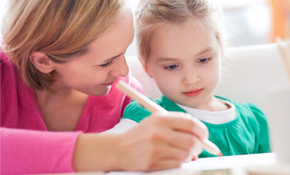Recently, we asked Labs participants a question that has been relevant ever since the beginning of formal education: should parents help their children with homework, or stay away from it and let their children do it entirely on their own?
A large number of participants expressed their views about the issue, with a number of parents having their say on this dilemmatic topic.
Here’s what we found…
Most participants believed that helping children with homework is a good idea.
Some strongly believed it is the parents’ duty; while others claimed education should encourage both parents and teachers both working to ensure the child’s knowledge and understanding of the topics.
However, a small number of participants believed that helping children with homework is a bad idea, as homework is to test their own abilities, not their parents’.
Some participants believed that it is neither a good nor a bad idea. Many suggested that parents should help if they are asked, yet should allow their children to give it a go first.
Click the headings below to see the summary of Labs participants' thoughts, as well as their comments.
Participants who believed parents helping their children with homework is a good idea

Some parents strongly believed that it was the parents’ duty to assist their children with homework. However, they stated it does not imply that parents should do their homework FOR them.
“The number of hours and size of classes mean that a child does not always get the point being made. It is the DUTY of the parent to assist your child to make the most of his/her education. However, I do NOT approve the parents writing the homework” Roger J. , Kent
“Helping does not mean doing it for them. But how else are kids to learn if they don't understand something, but by asking and being taught, or looking it up. Presumably if the school didn't want the pupils to either looks facts up or ask how something was done they would give them work in class instead of at home. It would seem frankly insane not to provide support for one's own children, anything else is surely neglectful/poor parenting” Phil A, Essex
Helping children with homework is a nice way to get involved in their lives, give them confidence, show them that you are there to help and keep up with their child’s schooling, many believed.
“Parental involvement and support in education, right from reading to them as a small child has been shown to be a key determinant of educational achievement. Yes, as children they advance in age they do need to develop independent study skills and sometimes when a child is really struggling it can be a fine line between helping and doing it for them; but nonetheless helping with homework is a key way of building children's confidence, abilities and respect for school and education more broadly” Ben W, Bury
“All parents should help with homework both to keep up to date with their child's schooling and also to help with any problems or questions - especially at primary & early secondary school levels” Anon
“Showing children that you are interested in their school work gives them encouragement and confidence to work hard. Helping them with homework does not mean doing it for them - just giving them guidance and support and that's what parents are for!” Kate, Chester
“Children need to know parents are there to support. Even if this entails the parent not knowing the first thing about the subject or a very knowledgeable parent allowing the child to develop. In both cases it creates a bond between the family” Denise, Scotland
“Creates a bond with the child and shows active interest. Also keeps the parent/guardian up to date with current education standards and methods” Bill, Norfolk
Children should be helped because education depends both on what is being taught at school and home. Also, while at school the sizes of the classes mean that children do not always get one-to-one tutoring; this is made possible at home, many thought.
“Education is a partnership between school and home. The most important thing we can give our children is education” John Clywd
“You can offer a one to one tuition and time, whereas teachers have to divide themselves between twenty to thirty pupils. It is logical that a child will endeavour to seek favour with a parent for effort and it is good for the bonding process too” Davie John, Hampshire
Participants who believed that helping their children with homework is a bad idea
A few parents said that it is about the child learning, not the parents; hence the child should be taking responsibility for doing their homework. Involvement of parents should not be something taken for granted. Plus, it could undermine child’s abilities when parents are not around to help.

“My children's school sets homework that assumes a heavy involvement from the parent: I've already been to school and my children are the ones being educated so I don't need to learn how to make a cardboard volcano. I give advice and assistance if my kids get stuck, but my assumed involvement is not at all welcome” David, Hants
“It is like setting them up for a fall. Its stuff they need to know, not the parents!” Anon
“A child needs to take the responsibility of doing their own work. If parents do too much it stops the child learning some self-reliance and responsibility and keeps them dependent. If a child is struggling it is fine for a parent to make suggestions of avenues the child can try, but if the parent does too much it masks the fact the child is struggling and gives teachers a false impression of what the child can do”
Others said that parents’ involvement would be counter-productive, as children need to think independently and need to build confidence by doing homework on their own.
“Homework is central to the development of children's brains and thought processes. It also builds up confidence in one's own work and creates a sense of thought independence that is very important for children to develop. It is dishonest and counter-productive for parents to be involved” Cristopher H. London
Participants who said helping children with homework is neither a good nor a bad idea
Some believed that it is acceptable for the parent to guide their child to the right direction with their homework, but only so they could find the answers themselves.
“I see no problem in pointing the child in the right direction by asking them questions that will lead them to discovering the answers themselves. I do not believe that the parent should take over the work and hand it back completed as the child learns nothing” Rob H Braintree
“They often need to be chased to get the homework done. Sometimes they don't quite understand what is wanted. I feel it is fine to give some assistance with sorting out how to approach problems. Have to be careful though. It is too easy to just give them the answer” Andy G, Somerset
“My children are well grown up and no longer need my assistance with homework. When they were at school and struggling with homework we would discuss the methods and ideas behind the homework. For example, when my son had difficulties with long division we showed him how to do it and let him practise before he did his homework. When my daughter was bogged down in history we would discuss around the topic. But, they both DID their homework. We just discussed the topics with them” Anon
“If a child tries and is stuck then giving assistance that points them in the right direction would be beneficial, telling them the answer would not help them” Anon
“Parents should be able to guide their children to find the answers, but not to give them the answers” Anon
Some participants who said that helping children with homework is neither a good nor a bad idea believed that homework (for young children as well as generally) should not exist in the first place.
“I'm against the idea of homework in the first place, but while it (unfortunately) exists I've no preconceived ideas on how involved parents should be because every child is different, and a good parent would know this” Anon
“It is ridiculous that children under the age of 12 are given homework, except reading and the occasional research projects, in the first place. I speak as a teacher. Homework that is completed usually bears the mark of an adult. Often when marking I am very tempted to write the comment, "Very good Mr/Mrs X". What benefit can there be?” Margaret, Cumbria









